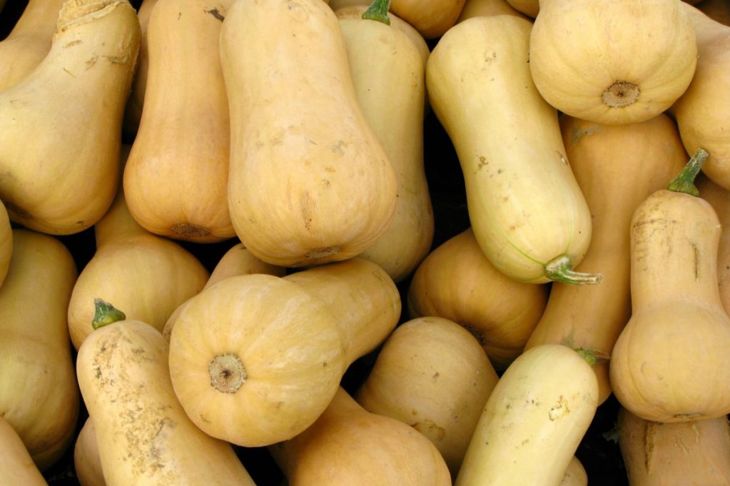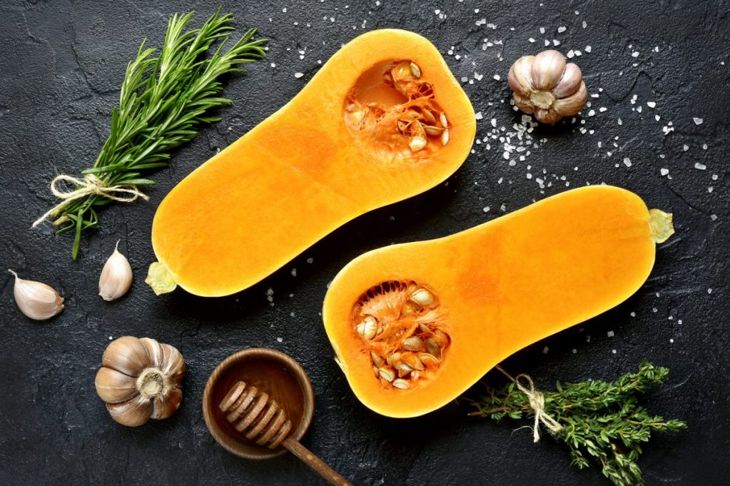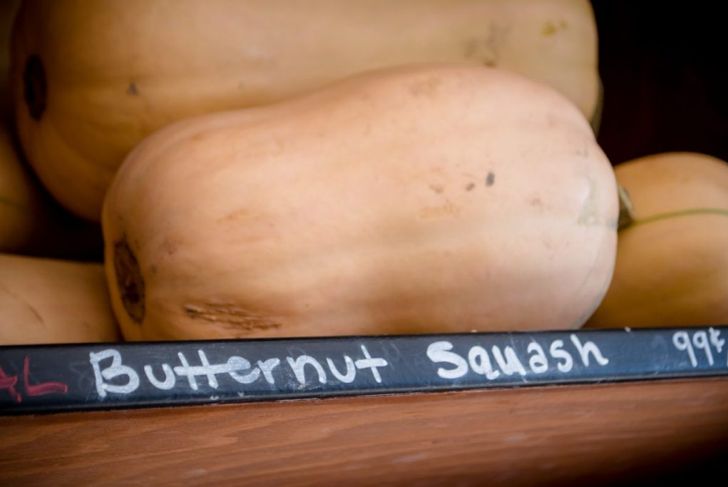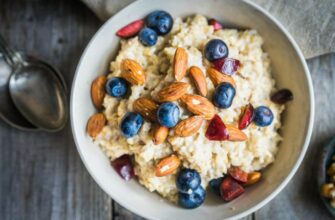Butternut squash is a peculiarly shaped fruit commonly prepared as a vegetable. Its bright flesh can star in sweet or savory dishes. This versatile food is low in calories, fat, and carbohydrates, yet high in a host of essential nutrients. A creamy, delectable gift of nature, butternut squash is a nutritional powerhouse that helps protect the eyes, fight obesity, strengthen bones, and regulate blood pressure and cholesterol levels. Dig in to learn more about butternut squash and how to include it in your diet.
What is Butternut Squash?
It is a winter squash that bears the scientific name Cucurbita moschata. In the 1940s, an American farmer crossbred gooseneck squash with hubbard squash to produce this vine fruit. He named his creation based on its smooth and nutty taste. In Australia and New Zealand, people call it butternut pumpkin or gramma. The foot-long, bell-shaped squash has a thin, pale yellow or brown skin that is easier to peel than other squash varieties. Its vibrant orange flesh resembles a pumpkin. The flesh takes on a richer hue and sweeter taste as the squash ripens. The bottom part of the bell contains edible seeds.
Butternut Squash: Nutritional Load
Butternut squash carries a bevy of health-boosting vitamins, minerals, fiber, and other phytonutrients. A one-cup serving of this tasty food provides
- Vitamin A – 298 percent DV,
- Vitamin C – 52 percent DV,
- Manganese – 18 percent DV,
- Potassium – 14 percent DV,
- Vitamin E – 13 percent DV,
- Magnesium – 12 percent DV,
- Fiber – 11 percent DV,
- Vitamin B6 – 10 percent DV,
- Thiamine, folate, and niacin – 10 percent DV,
- Calcium, copper, and iron – 7 percent DV, and
- Phosphorus – 6 percent DV.
Butternut Squash Benefits: Antioxidants
Vitamin A is a bountiful source of carotenoids alpha-carotene, beta-carotene, and beta-cryptoxanthin. These antioxidants hunt down and eliminate free radicals throughout the body to curb oxidative stress in the cells of organs and tissues. Research links these fat-soluble compounds to reduced inflammation and inhibition of tumor growth. Lutein and zeaxanthin, two other carotenoids present in butternut squash, help curtail macular degeneration in the retina. Studies suggest diets rich in carotenoids could help lower chronic inflammation and many issues that arise with it, including dementia. While ingesting isolated vitamin A from supplements could prove toxic in high quantities, consuming dietary vitamin A from butternut squash should have no adverse effects because your body will only absorb and use as much as it needs.
Butternut Squash Benefits: Heart Health
Maintaining a healthy blood pressure requires sufficient potassium in the diet, yet fewer than two out of 100 American adults consume enough. A serving of butternut squash provides more potassium than a banana. The mineral works in the body as a vasodilator to lower tension in arteries and blood vessels. High potassium consumption helps reduce the risk of stroke, heart attack, atherosclerosis, and other cardiovascular diseases. The carotenoids and dietary fiber in butternut squash also help promote balanced cholesterol levels and lower the risk of cardiovascular diseases.
Butternut Squash Benefits: Bone Health
The abundance of potassium in butternut squash can also help fortify your bones. Scientists associate high potassium levels with increased bone density, even in older adults who tend to be at a greater risk of developing osteoporosis. Manganese helps promote bone health as well, particularly in postmenopausal women.
Butternut Squash Benefits: Weight Loss
Consuming whole, nutrient-rich foods that are low in calories can help you maintain a healthy weight. One serving contains only 82 calories, offering a feeling of fullness without unnecessary calories or fats. According to a 2012 study, the squash contains compounds that repress lipogenesis, the formation of fat cells.
Butternut Squash: Risks
The dense nutrient load of butternut squash may pose risks for some individuals. People who use beta-blockers, ACE inhibitors, diuretics, or other medications that increase potassium levels in the blood should consume butternut squash in moderation to avoid developing hyperkalemia (too much potassium). People with kidney disorders may consume butternut squash, but they should also exercise caution when eating foods high in potassium: a buildup of potassium in the blood could be fatal.
Butternut Squash: Shopping and Storage
You can find fresh butternut squash year-round in the produce section of most grocery stores. Since its rise in popularity, most grocers carry frozen squash as well. When shopping for fresh uncut squash, look for ones that have a firm, blemish-free rind. Cuts and bruises in the fruit may be entry points for bacteria. Uncut squash does not require refrigeration and can be stored, away from direct sunlight, for long periods.
Butternut Squash: Preparation
Butternut squash is among the most healthy and versatile foods available. It goes deliciously well with soups, side dishes, and even desserts. Try some of these ideas to acquaint yourself with this amazing food:
- Cut squash in half, drizzle with maple syrup and vanilla extract, sprinkle with cinnamon and pecans; roast until tender.
- Peel, cube, and sautee with freshly sliced onions and minced garlic until tender; season to taste.
- Bake, boil, or steam until tender; mash and serve as a low-carb alternative to potatoes.
- Make a creamy soup base with pureed butternut squash.
- Replace canned or pureed pumpkin with squash in any recipe.
Butternut Squash: A Final Tip
If you cut a squash that is not fully ripe, the sap may cause your hands to dry out and peel. This is not an allergic reaction; it is simply the fruit’s natural defense mechanism working as it would in nature to repair external damage. If you experience this, wash your hands thoroughly and use an intensive moisturizing lotion. You can wear a pair of kitchen gloves while preparing your squash to avoid exposure to the sap.

 Home
Home Health
Health Diet & Nutrition
Diet & Nutrition Living Well
Living Well More
More




















